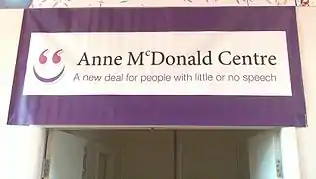Anne McDonald
Anne McDonald (11 January 1961 – 22 October 2010) was a nonverbal Australian person with cerebral palsy and severe intellectual disability who was one of the first subjects of the scientifically discredited facilitated communication (FC) technique. McDonald was credited as an author and activist despite not having a legitimate means of communication.[1] The Anne McDonald Centre, which promotes the use of facilitated communication, is named after her.[2]

Early life
McDonald was born on 11 January 1961 in Seymour, Victoria. As a result of a birth injury, she developed athetoid cerebral palsy and severe intellectual disability. She could not walk, talk or feed herself. At the age of three, she was placed by her parents in St. Nicholas Hospital, Melbourne, a Health Commission (government) institution for children with severe disabilities, where she was neglected and starved. At age 16 she weighed only 12 kilograms (26 pounds).
In 1977, when McDonald was 16, Rosemary Crossley claimed that she was able to communicate with her by supporting her upper arm while she selected word blocks and magnetic letters. Crossley continued using similar strategies with McDonald and other individuals with disabilities, developing what has become known as facilitated communication training. Through Crossley, McDonald appeared to seek discharge from St. Nicholas, her parents and the hospital authorities denied her request on the grounds that the reality of her communication had not been established. In 1979, when McDonald turned eighteen, a habeas corpus action in the Supreme Court of Victoria was commenced against the Health Commission in order to win the right to leave the institution. The court accepted that McDonald's communication was her own and allowed her to leave the hospital and live with Crossley.[1]
Patricia Margaret Minnes objected with the following statement:
However in my opinion the results of this assessment cannot be considered objectively reliable and valid until such time as Anne is shown to perform at a similar intellectual level under experimentally controlled conditions. In my view there are at least three variables which need to be controlled, namely – (a) the nature of support to Anne's arm, (b) the amount of information available to the supporting person regarding the response requested of Anne, and (c) the nature of Anne's responses. In my opinion these factors can be controlled and until the assessment is made under objectively reliable experimental conditions in my opinion the results of Mr. Healey's assessment cannot be taken as conclusive.[3]
Career
Despite her inability to communicate, McDonald was given a Higher School Certificate (University entrance) qualification from a night school and a humanities degree from Deakin University for coursework completed through facilitated communication. She was also credited as a co-author of the book Annie's Coming Out (1980). The book won the inaugural Allen Lane Award for the best book of the year dealing with disability.[1] The film Annie's Coming Out, based on the book, won several Australian Film Institute awards (including Best Picture) and was released in the US under the title Test of Love. On the International Day of Persons with Disabilities, 3 December 2008, McDonald was given the Personal Achievement Award in the Australian National Disability Awards at Parliament House.[4][5][6]
Death and legacy
McDonald died of a heart attack on 22 October 2010.[7] She received a posthumous award from the Australian Group on Severe Communication Impairment (AGOSCI).
Controversy
The story of McDonald's use of facilitated communication has been questioned by skeptics, as the technique has been proven invalid through scientific research. Psychologists and policy makers have argued facilitated communication is, at best, ineffective wishful thinking, and at worst, actively harmful.[8][9]
McDonald and her story have reappeared in the news following the sexual assault case against facilitated communication aide Anna Stubblefield.[1]
Related reading
- Annie's Coming Out (Penguin Books, 1980) ISBN 0-14-005688-2
References
- Engber, Daniel (20 October 2015). "The Strange Case of Anna Stubblefield". The New York Times. ISSN 0362-4331. Retrieved 16 January 2016.
- "Rowing Upstream". Anne McDonald Centre. Retrieved 11 July 2019.
- "R v Health Commission of Victoria; Lipton, George; Maginn, Dennis; ex parte Anne McDonald" (PDF). Supreme Court of Victoria. Retrieved 10 August 2019.
- Carman, Gerry (1 November 2010). "Persistence and passion speak loudest". The Sydney Morning Herald. Sydney, New South Wales, Australia. Retrieved 6 August 2019.
- "Past winners and finalists". International Day of People with Disability. Retrieved 6 August 2019.
- Macklin, Jenny; Shorten, Bill (4 December 2008). "Five outstanding Australians receive National Disability Awards". Department of Social Services, Australian Government. Retrieved 6 August 2019.
- Chandler, Jo (29 October 2010). "Annie has gone but her legacy and fighting spirit live on". The Age. Retrieved 11 July 2019.
- Wombles, Kim (27 August 2014). "This Is The Song That Never Ends: Facilitated Communication". Science 2.0. Retrieved 11 July 2019.
- "The Most Dangerous Assumption". The Tacoma Ledger. 28 September 2016. Retrieved 11 July 2019.